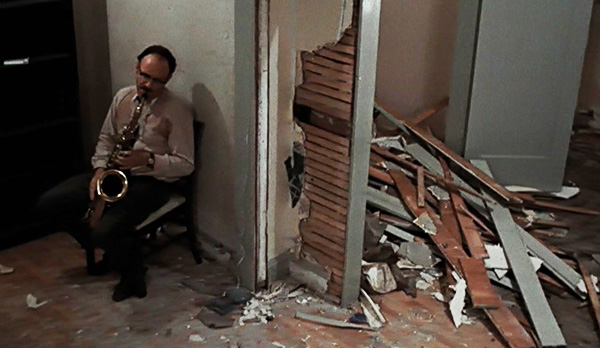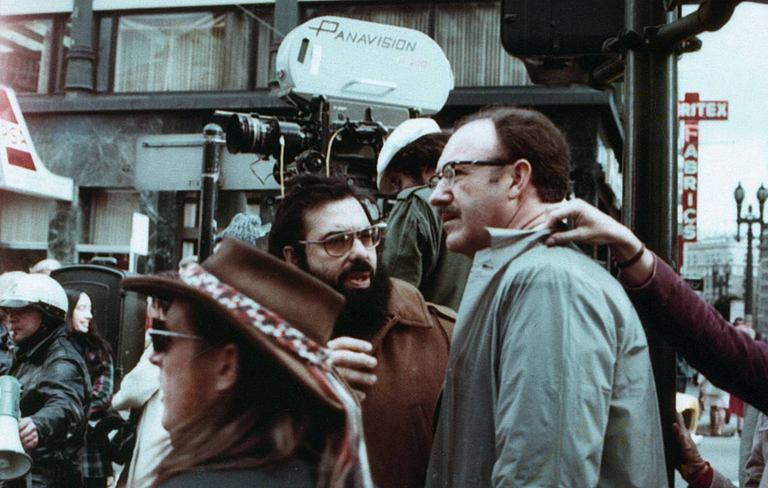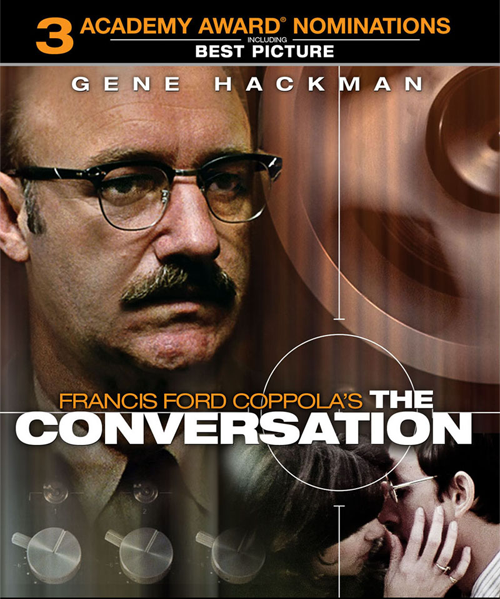The Conversation (1974)
Dir — Francis Ford CoppolaIn Coppola's The Conversation, a private eye specialized in surveillance is at severe mental unrest, when he conjectures that a couple he was spying on could be targets of assassination. The film could easily be born out of fear of surveillance, in a time when the practice was quite popular, specially by obsessed spouses to spy on their significant other to find out whether they're cheating on them! Now think about that! One of the characters of the film even makes a reference to it.
Although mass surveillance frequently makes headlines nowadays, it is nothing new. Back in the middle of 1800s, some stock broker tapped in telegraph wires and sold the market information he acquired. Surveillance evolved with the invention of modern technology, grew more sophisticated, more reliable and covert. But mostly it remained a private venture. Individual identities or companies professionally conducted surveillance on targeted individuals. For a very long time, it was certainly not to the extent what George Orwell imagined.
Orwell was on the right trail though, his version of mass surveillance materialized when governments entered the game. Cold War played a major role. And today, the targets of surveillance aren't merely an individual or a group, rather the entire populace of our planet. Everyone and everything that's connected to the grid, gets screened, monitored. The private individuals who conducted surveillance are a thing of the past, instead there are privately owned companies now who do this on a much much bigger scale.
Is it wrong? Of course. There has been outcries against mass surveillance throughout the decades. The ethics of surveillance is also a heavily discussed topic among the learned. But general people were quite complacent about govt initiated surveillance. The majority of us are still careless. How long can we be this complacent, is yet to be seen.
However, the film takes place in a time when private surveillance was still in fashion and the film's prime intention is not merely to protest against surveillance, it also urges us to question moral perspectives of invading a person's privacy and ultimately force choices upon them—and whether such propositions should drown our consciousness in reservoirs of guilt and ethical dilemma. It is a psychological thriller, not a political drama.
Coppola's concerns manifest as the delirium the protagonist Harry Caul (Gene Hackman) goes through. Harry is a master surveillance technician who's tailing a couple. Going back through the recorded audio tape, he suspects the couple are likely to be murdered by his employers.
Harry is a wizard in this field and proportionally paranoid with multiple locks at his door—contemplating potential murder born out of his surveillance pushes him off the edge, specially because he has a similar incident in the past. His paranoia grows thousand folds and slowly he descends into chaos and darkness of his own creation. He feels responsible for what he's done, even though he cannot be held responsible by the law, to him his hands are bloodied as well!

source
This moral reasoning is not unsound — if we take into consideration the reason for surveillance. As whistleblower American hero Edward Snowden says—surveillance is not about protecting citizens from terrorist attacks, since no significant improvement could be observed statistically, rather surveillance is about power. Having power over other people, the citizens in this case, and to use it against them when necessary. Harry, in the film, could see the monster he let loose. And his consciousness was in the monsters path.

source
Coppola is a master filmmaker and he wrote, produced and directed the film. His visual aesthetic style is dominant throughout it. The use of shadows and lights to visualize the protagonist's ethical dilemma outwardly is outstanding. Moreover, Gene Hackman, through a convincing performance, gives Harry Caul a realistic persona.
Coppola also creates an antagonist from an ideological point of view—another surveillance expert in the same town who has no moral sense at all and is only interested in the technological advances in the field and profits he can make. His inclusion in the film do not serve a villainous purpose, rather it is there to contrast Harry's humanity and represent surveillance megalomania.
The Conversation is a cinematic masterpiece, and while the practice of private surveillance may not be prominent now, surveillance and ethical questions regarding it never been more relevant. I fear for the future, and ironically wonder and wonder—how private even Harry Caul's days were!

You can read more of my film and literature related articles on my hive blog page.



Excellent film, I would definitely have reached it at some point. Congratulations on your choice and presentation.
Thanks for the kind words!
I believe films like these, works of arts that is, can be interpreted in many ways and different perspectives will only benefit the readers. So If you wanted to write, please do so. I'd love to read it. :)
Thank you, maybe later. It wasn't in the near future, to be honest, I didn't even think about this movie, because of you I remembered. I think that's what we do here, we propose films, we remember the best and we suggest what our colleagues should watch. Of course, each to his own taste.
Harry was facing a serious challenge... probably at first he thought what he was doing is for the best but often the best intentions can have the worst outcome... I suppose that's what really happened
It's actually his job and he kind of knew the risk. His psyche was disturbed by the accumulation of fear and previous trauma. See the film sometimes, I'm sure you'll like it. :)
Lockdown watch list 101
Downloaded rainmaker a few days back. Didnt manage to get around watching it. Hopefully will start within the first few days of the lockdown. And like that stubborn teacher who doesn’t stop handing out homeworks, you just gave out another on too of my seemingly infinitesimal watchlist:v